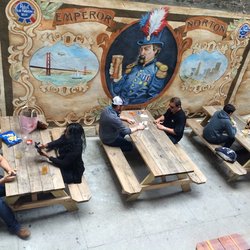|
“My mother was murdered on this spot.” Words mentioned by the bar tender, Dave, tattooed, with very pleasant voice and anthropology major, to new patrons at San Fransisco’s Emperor Norton’s Booze Club between Larkin and Turk in the Tenderloin.
Not his mother; rather, the mother of a visiting patron who did own a previous incarnation of this bar in the early 1970s. Death comes to us all, but death in the Tenderloin is truly one of merciless chance.
The Tenderloin is a locality of gristle, tragedy and ruin.
The Tenderloin is also the prism of tenderness and character, moments where torn souls find a community.
 It teams with life, as damaged as it might be; it is populated with broken matter and characters who are the greatest exposition of US individualism. This is not the pioneer spirit, so much as the pioneer dispirit. This is the Pilgrim’s Regression, the project of empire in disintegration, faith and the New World, degraded, if not shattered. It teams with life, as damaged as it might be; it is populated with broken matter and characters who are the greatest exposition of US individualism. This is not the pioneer spirit, so much as the pioneer dispirit. This is the Pilgrim’s Regression, the project of empire in disintegration, faith and the New World, degraded, if not shattered.
While sophisticated drone projects directed from American soil kill individuals who have no names for the Tenderloin locals, the residents here are also nameless to the rest of America. Their only identity cards are needles, used, lingering like lonely subjects on corners. Or cardboard mustered like fortifications around their gathered positions on the streets of their choice, a locality on Larkin, a spot on Eddy, a perch of determination on O’Farrell. Or shit heaped up on sidewalks; blankets infested with bacteria and purgatory’s whiff; broken bottles, an encyclopaedia of detritus.
Emperor Norton’s Booze Club is the successor to a range of bars stretching back to 1925. But we are not to know. Dave thinks so, but then again, he may not know. The deco element is still present, overlooking the bar like a Greek god of frivolous interference. The prior name was Deco, a place of stunning dinginess, drag acts, and casual fucking. The windows always seemed tinted, with the occasional betrayal of Stephan Elliot’s The Adventures of Priscilla, Queen of the Desert peeking through. Flesh freed, blood run wild.
The new management prefers clean propriety. The quest to keep the gay spirit lives, albeit in seemingly more curtailed, less raunchy circumstances. In truth, the façade of propriety has decorated the entire bar. There are old photos of the city, a tribute to the intersections between Larkin and Turk. Buildings destroyed by fire and earthquake, and buildings which have been protected by regulations.
Dave cuts a fine figure of gay lucidity. He is Mr Conviviality in tight singlet, generous tattoos, and swift on the cocktail make. His Bloody Marys sport asparagus and a beautiful, lava colour. His mimosas seduce the regulars. And his education stacks up in the chatty stakes, an anthropology bachelors and masters, disillusioned with academic incest and echo chambers. He now prefers examining the various facets of sexuality.
He finds himself serving Weasel. That is not his name, but his description. His hair resembles an overgrown bush, an assemblage of untidiness. He hits the shots with thirst. Tequila. Rum. More tequila. Even another patron palms off his tequila to Weasel. He is driving. “That’s why I don’t drive,” squeaks Weasel.
Weasel is an aficionado of narcotics, claiming the importance of purity. Mind altering substances are fine as long as you are a perfectionist. Many in San Francisco tend to have professorial chairs in mind altering substances. “You can get good stuff from the Hell’s Angels,” he surmises. They do the best. They know the best. The rest are amateurish masturbators without a clue, and their product is bound to poison your veins and screw with your vitals.
A regular comes in, a lean, taut girl with a skateboard, working at Libby Jane café over the weekend. She asks for a California Lager. “Is it $3?,” she inquires of Dave. “No,” comes the response. “Happy hour only from Monday to Friday. $4.” Response: “Does the fact that I just got off work count?” Weasel chimes in. “You’ve got to give it to her.”
 The “Happy Hour” concept is a stunningly long seven hours – 12 to 7 in the afternoon on weekdays. In other countries – Britain, Australia, New Zealand – happy hours are generally confined to the hour, a literal, biblical reading that combines neither profit nor pleasure in a fine cocktail. In San Francisco, and other parts of the US, happy hour has blown up, pluralising and multiplying with obese intensity. This city, in truth, is a long happy hour, the Pan complex of eternal youth as thoroughly developed as the Silicon Valley complex. The “Happy Hour” concept is a stunningly long seven hours – 12 to 7 in the afternoon on weekdays. In other countries – Britain, Australia, New Zealand – happy hours are generally confined to the hour, a literal, biblical reading that combines neither profit nor pleasure in a fine cocktail. In San Francisco, and other parts of the US, happy hour has blown up, pluralising and multiplying with obese intensity. This city, in truth, is a long happy hour, the Pan complex of eternal youth as thoroughly developed as the Silicon Valley complex.
Then comes in Tony. Stocky, well fed, cranky, curmudgeonly Tony, of small business fame and advice, with his radio show which he claims is heard by over a hundred thousand listeners. Tony is hell bent on throwing bile on his aunt, a woman who knows how to set him on edge. At 78, she seems a formidable woman of crankiness and determination.
Tony has retreated in frustration to the Boozeland, having left his abode in the Nob Hill, Tenderloin area which he claims is an unimpeachable pigsty. He does not cook, and expects the women who have pampered him in life to cook. This bar is where he can do some writing, though he laments one vital change: “I knew this place had changed when someone punched me in the shoulder and called me ‘Dude’.” Dave, the bar tender, is interlocutor, confessor, priest. He listens, patiently, to Tony’s reactionary summations. He gets the Mimosas, filled with wisdom and courage.
The change of patrons was the outcome of a management change. Deco had been on the market for years. It was only gobbled up two years ago, when new brooms and clothes came to redo the entire structure. Tony’s concerns seem to be a general lamentation about fidelity gone wrong, to the tried and true principles of gay San Francisco, and old San Francisco; gentrification fed by Silicon Valley money is filling the city on an overly supplied drip. Rental prices are skyrocketing, and the SF bubble is being fed by vanity and technology dollars, the price of supreme and sometimes daft innovation.
Observations about this eventually come back to that contested term of community. That the Tenderloin has one is undeniable. Amidst the spittle, released bowel contents, and expunged matter, lies a community that is clinging on to dear life. Ashen faces, psychiatric disorders, and unhappy souls may not be the bricks and mortar for such a community, but they exist.
As a reminder to this, the bar features shirts and photos to Leroy, a shrine below the television screen. The late Leroy was born in June 1934, supposedly a Tenderloin character. One of his sayings finds itself on the back of the shirt. “We may not always win but we never lose.” Touching, slurred nonsense.
A dog swings by (yes, a canine friendly bar) and sniffs Tony’s bag with instinctive hunger. A Vietnamese sandwich holds out hope for the quadruped, and those sandwiches, we are told by the queues of people who seek them daily, are something to die for. “Don’t fuck with me, or I will fuck with your dog,” he snarls to the owner – and his dog. Tony gets another Mimosa, tripling his drinks inventory. “I was not going to,” he ruefully concedes. Dave knows and wonders if he is up to partying later.
He might have. It was time to go to Harry Harrington’s on the next block, leaving the gay readers, the Alaskan recluses, the Eurasian beauties, the singing poseurs. Then have a “disco nap,” the term used for the religious party goer before the long night into the valley of lingering pleasures and dancing hopes. The Tenderloin will always have its followers, its adherents, the stubbornly faithful. Shattered lives will always have their Jerusalem, and Damascus conversions will always be found on Larkin. And Leroy will be remembered.
Dr. Binoy Kampmark was a Commonwealth Scholar at Selwyn College, Cambridge. He lectures at RMIT University, Melbourne. Email: [email protected]
|